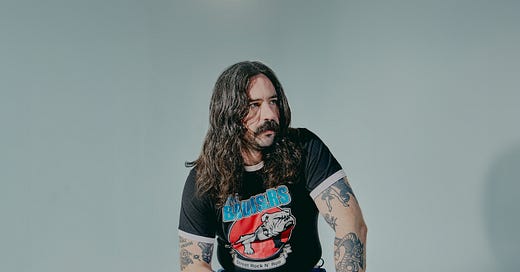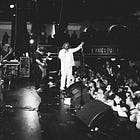An Interview with Chubby and the Gang's Charlie Manning
Musical legacies, the meaninglessness of art, and living a good life in a world that’s gone to shit.
Congratulations, you’re reading ZERO CRED, the only music newsletter ever to exist. Subscribe and get new posts sent to you for free. You can also support this independent publication by upgrading to a paid subscription which gets you a personalized membership card that provides you with irrefutable proof that you are not a poser.
When Charlie “Chubby” Manning sat down for this interview, he had a freshly buzzed head and a big, bushy mustache. I thought this was worth mentioning because, in every photo I’ve seen of the Chubby and the Gang frontman over the years, he’s been rocking a different look. Sometimes his long brown hair falls over his shoulders and other times it’s pulled back in a ponytail or braids. Sometimes he’s sporting a full beard and other times he’s clean shaven. It’s actually a bit difficult to pin down exactly what the guy looks like, and he wants to keep it that way. Someone once told him that altering his appearance every time he releases an album is “quite annoying,” and he’s been purposefully changing it up ever since.
Manning is not one for considering public image, nor is he concerned with how his songs will endure through the years. Chubby and the Gang exists right here, right now, and that’s all that really matters. There is an immediacy to the band which is driven home by its 100-miles-per-hour sonic approach.
The prolific, London-based Manning has relied on his Chubby and the Gang project as an outlet for the ideas that, for one reason or another, don’t fit in his other band, The Chisel. His third album under the Chubby moniker, And Then There Was…, was released last week. I talked to Manning on the album’s release day about musical legacies, the Misfits, and living a meaningful life in a world that’s gone to shit.
I didn’t realize when we set this interview up that the album’s release day is today. Congrats!
Charlie Manning: Thank you, man. I appreciate that.
How do you handle release days? Is it special to you at all?
Yeah. I try to kid myself that I don’t get tense up towards it, but I think I do. And when it’s out there, it’s almost a bit of a relief. When you see something fast approaching you, you think, “That’s gonna hit me.” And now it feels better that I’ve been hit.
There’s a nice time, very far back, where you’re like, “Oh, that’s months from now, that will never come.”
Yeah, and then it’s tomorrow and you’re like, oh fuck. [Laughs]
What are you thinking about in the days leading up to the release?
For me, it’s like, I’ve got this thing that I want to show people. I want it to be out. It’s almost like you’ve let a secret out. It’s not even that I think, “Oh, I wish people would like this!” It’s more like, I just want this out, because then it’s done.
I only have the capacity in my brain to focus on one thing at a time, maybe two. So I feel like I can’t fully put my mindset into the next thing until this first thing is off my plate.
I’m a bit more ADHD than that. As soon as it was done, I was like, right, I might do an acoustic EP or I’ll do another band. I’ll do this, I’ll do that.
Do you think that what you’re currently working on affects your next project? Do you see projects as being reactions to other things that you’ve done?
Usually, when I write music for records, I’ll overshoot how much I want to put on it and then take some off. Quite often, those songs that don’t make it to the record will be chopped up and put on a different record. Or maybe not even chopped up, they just straight-up go on the next record, because it suits it better. Or maybe it’s [used in] a different project. My mentality with music is: the wider the net, the bigger the catch. The more I get, the more I can do with it. So, I just sort of write music therapeutically, rather than necessarily, with a focused goal in mind. I think that’s why some of the records are a bit scatterbrained. This record, there’s a lot of stuff on it, which all sits next to each other, and sometimes it’s like, “Well, that’s a weird one.”
But that’s how you build a long-term audience, because the chopping-block material from one project might bleed into the start of the next project. And I feel that’s how you keep people strung along for a long time. It’s cohesive as a body of work.
Yeah, I think it’s also that, with Chubby and the Gang, I try to keep it as stream-of-consciousness as I can, in the sense that I like [the records] to be what I feel at the time, rather than with another band, where I’ll say, “Oh, this doesn’t sound like the band that we’re trying to sound like.” It’s come out of my head, and this record’s just a bunch of stuff that’s coming out of my head at the minute.
On this new record, you have this song, “To Fade Away,” which I thought sounded very Danzig-esque. And it reminded me that a British musician once told me that growing up in the UK, the Misfits seemed really silly to him and his friends. Something about it got lost in translation. I’m just wondering if you listened to the Misfits growing up.
Misfits, for me, was one of those bands where I saw people wearing the T-shirt before I really listened to the band. Remember there was that period where High Street shops were selling band T-shirts and a lot of people were wearing them? Being a teenager and being into punk music, especially British punk, I was suspicious. Then, when I did listen to them eventually, I was like, oh my god. Because I think it also depends on what era of Misfits you dive into. You could be getting in on the later stuff. There’s that record that’s all 1950s covers. If that’s the first one you pick up, you’re like, huh?
I had the same experience as a kid. When I was getting into punk, I was obviously aware of their imagery and their logo. And then when I was 13, that album American Psycho came out. That’s the one that I started with, and I was like, “This is the band people have tattoos of?” I don’t remember how I scrounged up $50 to buy the box set. But once I did, I was like, oh, okay, I get it now.
I had a pretty similar journey. I think “Bullet” was the song that I heard that I was like, “Oh my God. This is Misfits.” The first record was very early, ’76 or ’77 or something like that, which is crazy early. So, I mean, you have to fucking give respect where respect is due. They’re fucking amazing and one of the first, so fuck it, yeah.
It’s funny, because I see the Misfits as being antithetical to the bands you play in, in a way. Because a band like Chubby has no central image. I feel like every album cycle, the members change up, even your facial hair and your hair is different.
I sort of did that on purpose, the hair thing.
Really?
Yeah. Someone said to me, “Man, it’s quite annoying that you look pretty different on every album.” And I was like, “Hmm, annoying? I like that.” [Laughs] So, it was a little wind-up to this person that said it. And I’m continually doing it. Like, as soon as I did the promo shots for this LP, I was like, whomp, shave my head. [Laughs] And I donated it to a charity for kids with cancer. I didn’t just throw it in the bin.
I’m glad the luscious locks did not go to waste. That’s funny to hear, because my question was going to be: do you think about the visual presentation of a band like Chubby?
Nah. The art of the record, 100 percent. I’m really into psychedelic stuff, so that kind of shit, yeah. But when it comes to people playing in the band or what people are wearing, to me, I’m opposed to that kind of stuff. I don’t give a shit what other people do. I’m never, ever going to turn around to someone [in the band] and be like, “Hey man, do you mind putting on this hat? Because we’re all going to wear this hat today.” I’m in my thirties, man. I can’t be saying shit like that. [Laughs]
So, what’s most important about your bands? To put that another way, what do you most hope people take away from them?
To be honest, fun is my thing. I think a lot of the time, musicians get bogged down in meaning, and fucking everything has to be some sort of statement and it has to change something. But man, sometimes you just want to go to the pub and have a pint and talk to your mate, and that’s fine. There’s beauty in the minutia and there’s something really romantic about the meaninglessness of stuff. Not everything has to be this big thing that you have to think about. It can be like, “I finished work early today. It’s going to be a good day.” That’s it. Or “I feel like going to a gig tonight and jumping off the stage.” It doesn’t have to necessarily be a statement, it doesn’t have to be anything. I feel like a lot of musicians often get a little bit self-aggrandizing sometimes and that just needs to be knocked back a little bit.
Yeah. I was just reading an interview with Harmony Korine, the director who made Spring Breakers, and he kept getting asked what his movies mean. And he was getting really irritated by it. He was just like, “It doesn’t mean anything! I just want to show you a fluorescent light in a parking lot and let you think about the fact that it’s beautiful.”
And that’s completely fine. I think if you start making everything the opposite, it becomes this thing where you start taking the power out of people’s hands to create their own music. You don’t have to be educated to make music. You can be, or you cannot be. Everyone’s entitled to express themselves through [music]. “Be My Baby” is not necessarily gonna fucking change anything around the world, but it definitely makes me feel good.
That all said, is there a way to misinterpret what you’re doing? Like, have fans of yours ever read into your work in a way that you didn’t intend?
I don’t really exist online, so I don’t have many online interactions about that stuff. But in person, people have been like, “What does that mean? What does this mean?” And sometimes it’s been a little bit disappointing [for them] when I was like, “Man, this just is what it is.”
I get the aversion to interpretation, but I did want to ask you about one of the songs on your new record, “Love Song.” The lyrics are “Ain’t no tomorrow, so live today. Ain’t no God, no use to pray.” On the surface, it seems very nihilistic, but am I wrong in thinking that this is actually meant as a positive message?
That song is about being young and going through life like the Tasmanian Devil. Everything is just spinning around and everything’s going crazy. I call it “Love Song” as sort of an ironic response to love songs, really.
I apologize if this is too much of a philosophical question…
Hit me.
How can a person live a meaningful life in a time of unprecedented crisis?
I think the question’s got to be split down the middle. So, yes, we do live in a crisis. Does it mean that something being meaningful makes it any better or any worse? In my opinion, I think it would make it worse. I’m a big believer in existentialism, things being meaningful to the individual or not meaningful at all. And you have to try and see the absurdity in everything. I can’t change the world at all, but I can laugh at its ridiculousness at this minute, you know? To me, this shit is absolutely bonkers right now. I’m living in a simulation. I feel like at any minute now, they’re going to pull back the curtain, and it’ll be The Truman Show, and they’ll be like, “You got this far! Well done, mate.”
You got to the final level of life.
Yeah, here’s the final prize. And I’m like, wow! [Laughs]
I feel like I learned a lot about that futility from being in America and living through two consecutive presidential elections that are basically the same situation. I felt like, in the last election, I got so worked up and so vocal about it, but at the end of the day you realize that you’re not having any larger impact and all you’re really doing is creating a distance between you and the people in your life. You’re arguing with people about little details and neither of you are changing the larger problem, so it seems so pointless to do it again this year.
Yeah, when you have Christmas dinner and you’re sitting there with your uncle and he brings up European fishing regulations, you’re just saying, “...Okay?” [shrugs] I mean, I am political, myself. I’m involved in politics in the sense that I’m in a trade union and I’m involved in that and I support it and I pay my dues. But is Chubby and the Gang the band that’s gonna tell you about politics in South America? Probably not, but we can help you have a good time.
I think that comes across in your music. When I listen to your records, obviously they feel distinctly British, but I feel like you convey both a sense of pride in the UK, but an extreme sense of disappointment as well. Maybe it’s disappointment with the larger climate, but a pride in how you and your friends can live in it.
Yeah, 100 percent. And to continue with the politics thing, there’s politics that are just discussed in Parliament or the Senate or whatever, and then there’s how that actually manifests itself. So, if they put a tax on beer or something, I’d rather talk about the guy in the pub who’s like, “I can’t afford to have a pint anymore” than talk about the politician in Parliament who’s put that forward. I think politics often becomes this abstract and intellectual discussion, when the reality of the situation is actually quite simple. It’s basically that there’s people who don’t have much money, who need more money, and that’s what it boils down to for me. I think we need to be reducing the conversation to that. We don’t need to be like, “Yeah, if you look at chapter four of whatever…” Not really, mate. I just need to have a better rent situation. I don’t need to fucking read a book about it.
And the politicians who make those decisions that you’re talking about do not think about or see firsthand the experiences that you’re singing about. It’s why bands like Public Enemy became so popular, because they were people speaking for the streets in a way that politicians were completely oblivious to, you know?
Exactly. And I think drill is a good example here. Drill is talking about the effects of poverty, and people often criticize drill quite heavily. They’ll be like, it’s violent, it’s a lot of drug-taking. But people are essentially singing about the environment that they’re in, which is created by politicians, so you can’t tell me that that’s not political. It doesn’t say “I’m endorsing Parliamentary candidate John Smith” or fucking whatever, but it’s people saying, “I live in this environment, and you’ve created that environment, and this is how that makes me feel.”
A lot of people will expect musicians to talk about politics like a university student would. And I think that is classist, because essentially what you’re saying is, unless you use the correct language and unless you reference the correct points, you’re not able to sit at this table and have this discussion.
As someone who’s toured here in the States, what are the main differences that you’ve noticed between American punk and hardcore scenes and those in the UK?
UK is a lot smaller. And I mean that literally and in terms of the scene. In America, there’s a lot more romanticizing of English stuff. It’s not quite as exciting for British people to hear songs about London, for example. America is much more romantic for them. The venues are very different, too. A lot of stuff in the UK will be in pubs. You play pubs and then you sort of work your way up to a 500-cap venue. There’s not an in-between bit, and there’s not a lot of venues between the 150- to 250-mark. So, you’re playing a 100-cap room and then all of a sudden you’ve got to try and fill the fucking 400-cap. That’s quite strange. I think that’s quite a shock for a lot of bands. It’s like, “Oh shit. Where do we go now?”
And there’s fewer people in the UK punk scene, but they’re doing a lot. So, less people doing more. We’re also very close to Europe as well. So Paris is two hours [away]. So, you’re very close to a scene which is culturally entirely different. In America, obviously there’s cultural differences between the states, but if you drive from New York to Philly, that’s the entirety of England.
If you were to live in the US, what state do you think you’d want to be in?
I’m a city boy, so I like New York or L.A.
What do you like about them?
I’ve spent more time in New York, but L.A. is cool. If I had a car, I think I’d move to L.A. The first time I went to L.A., I stayed with someone in Orange County, right next to where they make Fender guitars. Fullerton, maybe? Sort of like an L.A. suburb-type thing. I remember I played a show with my old band, and then stayed at this guy’s house, Adam. Being from London, no one drives, basically. I walked out of his house in August and it was like fucking melting. Really hot. I was like, “Right, let’s get to the train.” And he was just like, “…Where’s the train?” Just standing on this concrete sauna, being like, “What do we do now?”
Yeah, no consideration to public transportation here. We’re getting the Olympics soon, and people have been wondering if that’s going to improve the public transportation situation.
I’ll say this. When they did the Olympics in London, which was a while ago now, they cleared out most punk venues pretty quickly. They had a big sweep of them, and they got rid of a lot of cool stuff. So yeah, be careful. A lot of the squats that gigs were being held at—there were these two called Rampart 1 and Rampart 2—where I played my first show, actually, as a child. That went immediately. They were just like, “Right, the Olympics are here. You lot, fuck off.” That was it. It was so quick.
And then what happened once the Olympics were gone? Did those places rebuild?
Nah, they turned them into, like, fucking new-build, expensive flats and shit. They do this big sell where they’ll be like, “Yeah, there’ll be a fucking swimming pool for people to swim in and there’ll be a fucking archery range and shit!” But it’s like, really and truly, who is able to use that shit? As you can tell, I’m not a very big fan of the Olympics. You can quote me on this. I think it’s shit. [Laughs]
As a music fan, if you could have lived through any scene, anywhere in the world, in any time period, what would you pick?
I would have loved to have experienced the Delta blues thing. I’d just love to have been around at a time where I could have had an unbiased view into Southern Black music at that time, like Mississippi Delta-type shit where it’s not getting filtered through the lens of some historian.
Not the documentary version.
Yeah, it’s not a documentary, I’m just here at the bar witnessing it. Robert Johnson, things like that would’ve been cool. Either that or, I guess, Woodstock or something.
The original ’69 Woodstock?
Yeah. [Laughs] No, not the fucking [’99 festival]. Imagine that was my answer. Imagine I was like, “Oh, I’d love to see Limp Bizkit at Woodstock. I’d love to have been at the one where everyone was drinking out of the fucking sewage.” If it was me and I was there at that Woodstock, I would have fucking left early. I don’t know why people stayed to the fucking end.
Do you think at all about your legacy? Do you think about how Chubby will be received 20 years from now?
Nah, nah. Honestly, I know that sounds like I’m trying to sound like I don’t give a fuck, but I think the serious answer to that is that music is contextual. Everything about it is contextual. Opinions change and things come in and out of vogue. Like, Oasis, when they were first kicking about, obviously they were a big band, but they weren’t what they are now. Things change and bands go the other way. Blur went the other way. They were massive at the time and now they’re second to Oasis and you can’t really argue otherwise. That’s sort of my point, is that it’s not good to think about something where the boundaries are ever-changing. People might one day just be like, “Actually, this record’s fucking shit,” and then it’s like, well, it was good for five, ten years, whatever it was. And that was it.
This interview has been edited for length and clarity.
And Then There Was… is out now.
MORE READING
FOLLOW ME
Instagram | Threads | Bluesky | Twitter | Website
Real life: PO Box 11352, Glendale, CA 91226
Get my book SELLOUT at Bookshop, Barnes & Noble, or Amazon.








